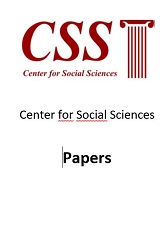Material Deprivation and the Outcomes of Elections
Material Deprivation and the Outcomes of Elections
Author(s): Alexi Gugushvili
Subject(s): National Economy, Civil Society, Governance, Economic policy
Published by: CSS - Center for Social Sciences
Keywords: Parliamentary elections; Georgia; material deprivation; multivariate analysis;
Summary/Abstract: This study shows that the district level outcomes in the 2012 parliamentary elections in Georgia are significantly associated with the mean household deprivation levels. This effect is statistically significant after controlling for the regional dummies, urbanisation level, current district’s population size, the proportion of orthodox population, local ideological preferences, and the rate of turnout on the election day. The OLS models of the share of received votes in the proportional system and the logit models of the odds of victory of a party candidate in the majoritarian contest both reveal that the districts with the lowest and highest material deprivation levels were more likely to vote for the oppositional coalition. The results are robust even after excluding from the analysis two fraud-prone regions of Samtskhe-Javakheti and Kvemo Kartli.
Series: CSS - Working Papers
- Page Count: 18
- Publication Year: 2012
- Language: English
- Content File-PDF

